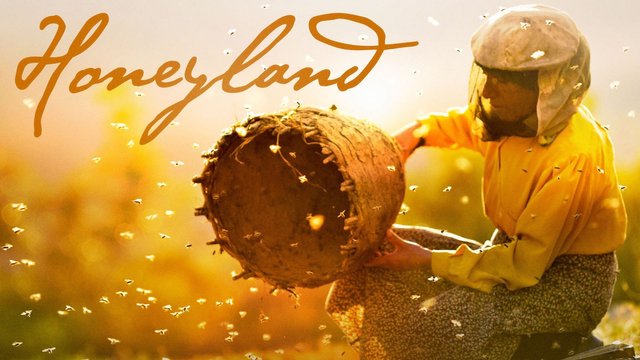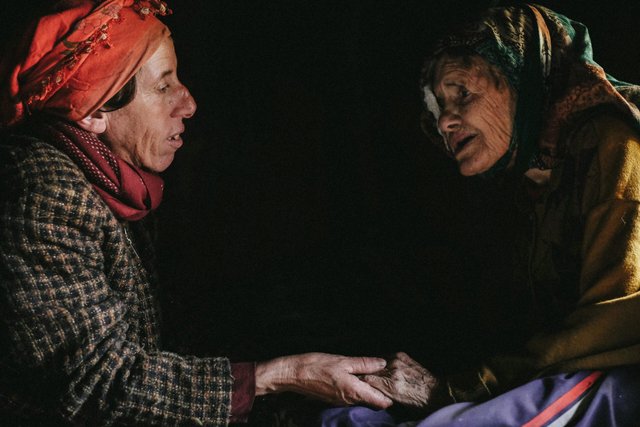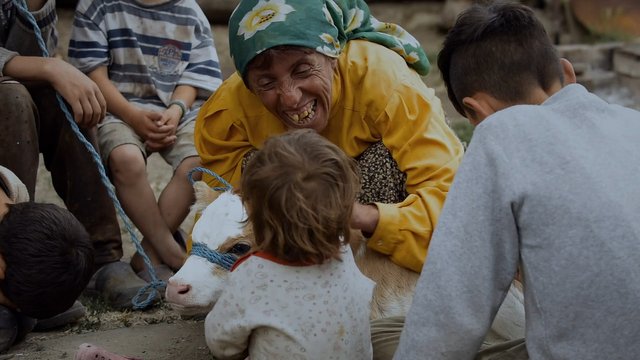Honeyland: The Fight Against Over-Exploitation. Cinema that cinephiles wait years for.

The visually stunning Macedonian documentary "Honeyland" follows a female beekeeper in her daily struggle for survival. A penetrating and poetic portrait that shows how much traditions are under pressure and how fragile the balance between man and nature is. After all, progress comes with the urge to plunder resources for a quick profit, threatening the very existence of patient people who want to take advantage of the resources in the longer term.

"Half for them, half for us," says Hatidze, a conscientious beekeeper who scrambles up sheer cliffs in Honeyland to find bee colonies. When she recovers honey from the honeycombs, she immediately gives some back to "her" bees. Beautiful but also sensible, because those bees have to work hard to form the wax for honey production. For example, in order to form 1 kg of wax, bees must collect about 10 kg of honey and 1 kg of pollen. Because they have to visit about 3 million flowers for 500 grams of honey, they are economical with the wax needed to build the cells of the honeycomb. Hatidze lives in harmony with the bees and therefore helps them survive. Very often she also sings for the bees that provide her with an income.
Respect, that’s the key.
The amiable beekeeper also respects her product. “My honey is pure, I don't add sugar to create more volume,” she says when she descends from her small stone cottage in North Macedonia to the market in the city, a four-hour walk, to sell her pure honey for 10 euros a jar. While she's there, she immediately notices that all the products she wants to buy herself are terribly expensive. As if her life wasn't hard enough yet, she also has to take care of her bedridden mother Nazife. She never leaves the house where there is no running water and electricity, and appears to be quite stubborn. But she also feels guilty, “I'm just making your life more difficult”.
In conversations with her mother, the idea arises that she might have been better off married, but it does not generate bitterness, sadness, or anger. Hatidze is very zen and accepts things without complaint. “It is what it is”, you see her thinking. That's also why she reacts hospitably and openly when suddenly a wandering family with an old caravan, seven unruly children and a herd of all-devouring cows settles down next to her property. She sings to the children and lets them help take care of the bees. While the parents can barely cope with their noisy children. When a little boy pushes his sister against a tree, the mother's reply is a curse: "May your head fall off!"

Looking for profit
Father Hussein and his children help cows give birth, but it is clear that they have not a clue about wild bees. They show no respect for them and are therefore regularly stung. Initially, this is funny, but it quickly becomes (also figuratively) painful. Hatidze wants to teach the family a few things about bees, but Hussein only sees an opportunity to increase his "turnover" by also breeding bees. Only, under the impetus of a buyer who asks for more honey, he does not leave enough honey for his bees so that they are going on a rampage with Hatidze's. A large bee mortality is the result. "They're killing all my bees, there's nothing you can do about it," Hatidze sighs. But she doesn't turn her pain and sorrow into anger or resistance against the invaders responsible for this tragedy.
Eventually, the family moves away when their cows start to die, leaving Hatidze with her blind mother and a helpless kitten. When Nazife dies, Hatidze organizes a nocturnal farewell ritual with torches and she makes her way through the snow to find a new bee colony, in the company of a dog. Together they share the honey. Worker bee Hatidze, who sacrificed her life for her mother, has someone to take care of again. Someone with whom she can continue to live in harmony with nature...

Portrait and fable
Honeyland is a very human and visually breathtaking film, shot with a small crew over a span of three years. This fly-on-the-wall documentary began as a portrait of Hatidze and Nazife but evolved into a neo-realistic fable focusing on both the need for a balance between man and nature and the danger of the capitalist robber economy. There is an "end of an era" feeling about this sketch of a fragile existence. Hatidze is a woman of few words, even though she realizes that her "old life" is in danger of disappearing. The filmmakers respect that. They let the images speak for themselves. It hits you like a sledgehammer blow. One that continues to resonate.

Honeyland [Official Trailer]
Tamara Kotevska and Ljubomir Stefanov discuss Honeyland at the 48th edition of New Directors/New Films, which took place at Film Society of Lincoln Center and the Museum of Modern Art on March 27-April 7, 2019.
Tells a story of a forgotten place so strange that most Westerners couldn't even imagine it. - The Hollywood Reporter
The most awarded film at last year's Sundance Film Festival
Mesmiracally beautiful. - Indiewire
Cinema that cinephiles wait years for. A must see. - 48 Hills